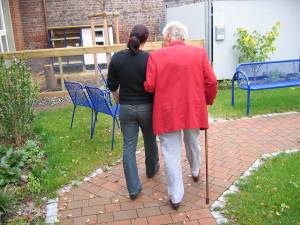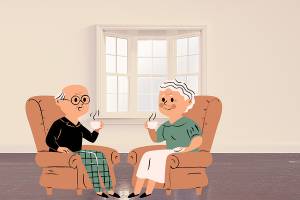The aging process is an inevitable part of life. However, it can be met with uncertainty when the aging process is accompanied by health problems and difficulty affording accommodation or medical care. The elderly often find that their social security benefits are not enough to cover living expenses, especially if they are forced to live with a spouse who has not worked for years or has a disability. This leads the elderly to face extreme financial burden, which can be mitigated by understanding affordable housing and healthcare options.
Affordable housing is vital to the health and well-being of seniors. As a person ages, their health care needs become more expensive. However, affordable housing that allows for independent living reduces the cost of care. Affordable housing is available in two forms: government subsidized low income housing and rental options that do not require government subsidies.
Government subsidized low income housing is set up specifically for seniors with little to no income. Most regions have federally-subsidized housing programs that deal with the elderly, such as Section 8, or the Housing and Urban Development (HUD) home ownership program. Through these programs, elderly and disabled individuals can find reasonably priced housing options in which they will be able to remain independent.
Government subsidized low income housing has two different tiers of affordability: designated market rate (DMR), and moderate income (MID).
The government sets a cap on the number of units available through various programs. The DMR units are owned by the government, and rent is paid through Section 8. The MID units are owned by local authorities, but the majority of them accept some form of subsidy from HUD or other sources.
MID housing has been defined as housing that can cover a family’s basic needs with an income of between $40,000 and $89,000. There is no guarantee with these types of programs for a specific type of placement in terms of location or construction quality. However, the rent is cheap and on a long-term lease.
These programs do not require applicants to be disabled or elderly, but the units are reserved for the low income. However, in some cases it is possible to work with a local community organization that specializes in affordable housing opportunities such as church groups. There may be some fees associated with this process in order to finance the creation of an application package that will be submitted to HUD for processing.
Rental options that do not require government subsidies can be found in the form of a (1) retirement community and (2) independent living facility. In a retirement community, individuals can live in their own apartment at an affordable rate. This is an ideal situation for seniors who are accustomed to living on their own, but need help with medical care and other necessities.
Retirement communities are also an excellent choice for individuals who are relatively healthy with some sort of disability. This is because they often have medical care centers on site or nearby. Also, most retirement communities maintain a measure of independence by allowing residents to cook their own meals and stay in their own apartment.
Independent living facilities provide group housing for seniors who desire to live with others of the same age, but maintain an independent lifestyle. These facilities may have medical care services available and often provide a transportation service for their residents.
The living situation of seniors has a huge impact on their quality of life. If they can afford to live on their own, many choose to remain independent. However, if their finances are tight and they need help with medical care, and other necessities that are provided by government subsidized low income housing and rental options, affordable healthcare is the best option for them.
Affordable healthcare is available for seniors who have financial difficulties and are not eligible for government subsidized low-income housing or rental options that do not require government subsidies.
Affordable healthcare programs for individuals with very low incomes are a patchwork of programs, such as Medicaid and Medicare. Seniors with very low incomes may also qualify for CHIP (Children’s Health Insurance Program). These programs only set aside a certain number of funds in each region. As a result, they are often oversubscribed, which means that individuals must apply in order to receive coverage.
Medicaid is available for those who do not qualify for Medicare. However, Medicare is often the best option because of its comprehensive coverage and relative ease of enrollment. In addition to being easy to enroll in, Medicare also offers a discount on premiums for individuals with low incomes who are over 65 years old.

 One of the most basic necessities of living is being able to afford a place to live. This means having a safe, stable, and affordable home. But for some people this isn’t an option because their income is too low to be able to afford it on their own. In these situations the government may provide the assistance needed in the form of subsidized housing or low income assisted living.
One of the most basic necessities of living is being able to afford a place to live. This means having a safe, stable, and affordable home. But for some people this isn’t an option because their income is too low to be able to afford it on their own. In these situations the government may provide the assistance needed in the form of subsidized housing or low income assisted living.
 These requirements include things such as the ability of the senior to pay a portion of their rent as well as being at least 62 years old. They must also fall within an annual income range as determined by HUD and be a citizen of the U.S.
These requirements include things such as the ability of the senior to pay a portion of their rent as well as being at least 62 years old. They must also fall within an annual income range as determined by HUD and be a citizen of the U.S.